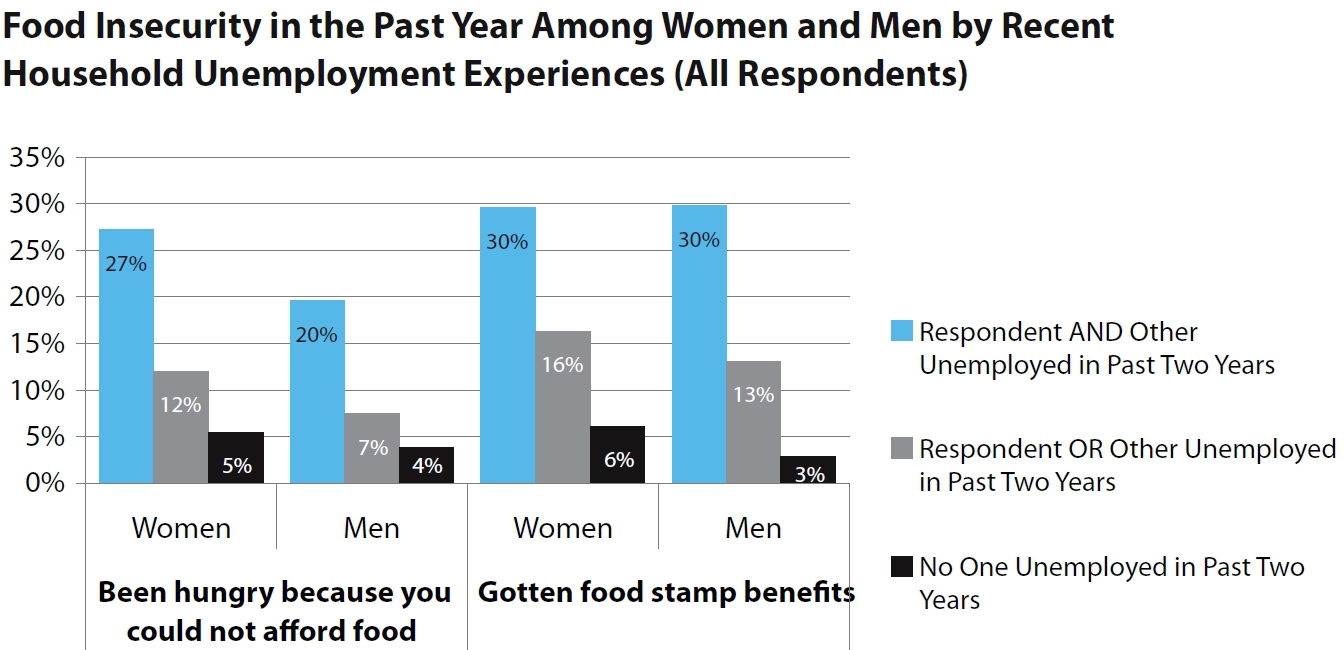After the Great Recession

Frequently referred to as a ‘mancession,’ the Great Recession of 2007 to 2009 hit men much harder than women initially. Men’s employment fell farther and faster than women’s, as the male dominated construction and manufacturing industries each lost more than a million jobs while the only industry that gained jobs every month was health care, one that employs more women than men.
The recovery period is however a different story. In the past two plus years since the recession was officially declared over, women lost jobs while men regained some of the jobs they lost. For women the recovery has not yet begun, and their economic worries have not abated.
It is almost as if women and men have had two different recessions and are now having two different recoveries. Case in point: 50 percent of women aged 18 to 34 report in a recent IWPR survey funded by the Rockefeller Foundation that they were unemployed and looking for work sometime in the past two years; the figure for men in the same age group is 24 percent. Single moms report experiencing a month or more of unemployment in the past two years at roughly double the percentage of other parents: 42 percent of single moms compared with 21 percent for married dads and 26 percent for married moms.
Both women and men by the millions still report severe economic distress two years into recovery, but women have the worst of it:
- Ten million women and six million men aged 18 and older report having gone hungry in the past year because they could not afford food.
- Twelve million women and eight million men have gotten food stamp benefits in the past year.
- Forty-one million women and 27 million men are currently having difficulty paying for other basics like utilities.
Among Americans lucky enough to have jobs, only 35 percent of single moms, compared with 58 percent of married dads, say they have enough personal savings to cover two months of earnings if they lost that job. Not so surprising, since we know that single mothers are disproportionately poor—not only do they have multiple mouths to feed but they are typically doing so on their own, without an additional earner. But here’s a surprise: married mothers report a level of personal financial security more like that of single moms than like that of their husbands: only 31 percent say they have enough savings to cover two months of earnings.
Married moms are just about as likely as single moms to say they are having trouble paying for health care for their families, at 38 percent for single moms and 34 percent for married moms. But only 17 percent of married dads report they are having trouble paying for their family’s health care.
Looking at the future, both men and women worry about losing health care, not saving enough for retirement, and not having enough to maintain their standard of living in retirement, and both men and women report being substantially more worried about these issues in 2010 than they were in 2007, before the recession began. But on virtually all types of worries and in both years, women are much more concerned than men. For one example, in 2010, 58 percent of women are worried about not having enough money to live on in retirement, and 43 percent of men are similarly worried.
Although the gender differences are striking, these numbers are shocking for both women and men: 43 percent of men worried about not having enough money to live on in retirement? Sixteen million adults going hungry in the past year for lack of money? These numbers should simply not be so in the richest nation in the world.
Women’s greater expression of worry fits with so much of what is known about women’s lives. In this survey, women report experiencing greater hardship across the board: hunger, not filling medical prescriptions, skipping doctors’ visits, having to double up since the recession began for financial reasons (17 percent of women versus 11 percent of men). According to Census Bureau data, the typical woman who works full-time, year-round earns only 77 percent of what the typical man earns for full-time work. Women more often raise children on their own than men do. Women live longer than men and when older are much more likely than men to live alone and much more likely to be poor.
For many reasons, women living without men in their households have a lower standard of living than married couples or single men. But the differences observed between the experiences of women and men even when they report living in the same type of household—married couples—raise a further concern. Researchers typically measure the well-being of family members by assuming all members of the family share all income equally. The survey results suggest men and women in families may have different access to family resources, or perhaps different family roles (who pays the bills, who takes the child to the doctor) that lead one gender to express more hardship—with women worrying more about not taking a child to the doctor for lack of money, not having savings to cover two months of lost income, not having enough money to live on in retirement. As the sociologist Jessie Bernard observed in 1972, there is his marriage and her marriage and they are not the same.
What do women want? According to the survey: jobs, jobs that make it easier to meet family demands, economic security, equal opportunity, workers’ rights, more generous Social Security benefits, and no cuts in either Social Security or Medicare. The say they will support candidates who will work for legislation on these issues. Men say the same, but not in quite as large numbers as women.
More articles by Category: Economy
More articles by Tag: Working families




























